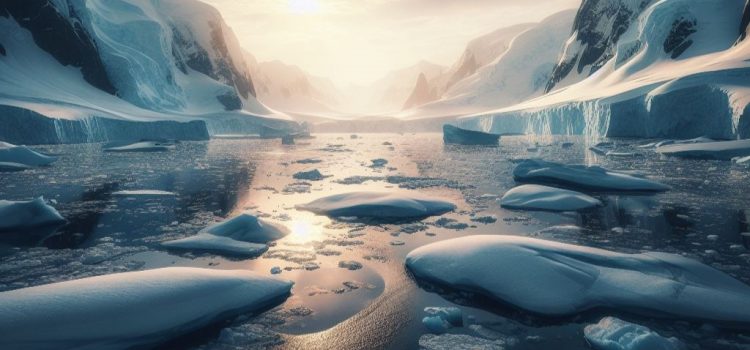
This is a free excerpt from one of Shortform’s Articles. We give you all the important information you need to know about current events and more.
Don't miss out on the whole story. Sign up for a free trial here .
Antarctica is melting, but why is that so consequential for the climate everywhere else on Earth? Would cutting emissions now help the situation?
Changes that occur in Antarctica have planet-wide effects because the continent helps regulate the global climate. With the sea ice at its lowest peak since records began, some scientists are beginning to worry.
Keep reading for a look at the three new discoveries about the loss of ice in Antarctica.
Antarctica Affects—and Is Affected by—Climate Change
Odds are that you’ve heard that Antarctica is melting—but how does that affect you? Antarctica is a unique continent. A landmass covered by an ice sheet nearly three miles deep, it’s the only continent with no countries and no permanent human population. It’s also the largest (and coldest) desert in the world. But Antarctica is also unique in its relationship to climate change: It’s deeply affected by the warming of the earth. And as a major contributor to sea level rise, it has outsize effects on climate change across the planet.
What’s Happening With Antarctica’s Climate?
Changes that occur on the southernmost continent have planet-wide effects because Antarctica helps regulate the global climate. It does this in a few ways: Its icy white surface reflects solar radiation off the Earth, keeping temperatures down. The ocean currents and wind patterns around it also shape worldwide weather patterns. Plus, its ice holds 70% of the planet’s freshwater—most of it in two massive ice sheets, but also in the sea ice that fringes the coastline and the ice shelves that extend from its land over the ocean. Melting Antarctic ice contributes to rising sea levels, which NASA considers one of the planet’s “vital signs.”
Recently, scientists have shared three new discoveries about the loss of ice in Antarctica. They say that 1) the continent’s sea ice is shrinking, 2) its ice shelves are losing mass, and 3) its glaciers are disappearing. And some of these changes are happening more rapidly than previously thought.
1. Antarctica’s Sea Ice, Which Protects Against Sea Level Rise, Seems to Be Shrinking
Antarctica is surrounded by the Southern Ocean, which freezes into sea ice in winter and melts back to the coastline in summer. When there’s less sea ice, Antarctica’s glaciers and ice shelves have less protection against the warming ocean.
In 2023, the sea ice reached its lowest peak since 1979, when satellite records began. However, not all experts agree that recent low levels are cause for alarm. In fact, some contend that the current trend toward lower sea ice levels might not be significant at all.
Some scientists say it’s too soon to tell how alarming the sea ice shrinking really is. The amount of sea ice around Antarctica doesn’t directly affect sea level rise. But if there’s less sea ice to protect the continent’s glaciers and ice shelves from melting, then they’ll melt. And that contributes to faster sea level rise and flooding around the world.
2. The Continent’s Ice Shelves, Which Protect Its Ice Sheets, Are Losing Mass
Scientists are concerned about the melting of ice on Antarctic land, too. The continent’s ice shelves are losing mass.
Antarctica’s ice sheets have been a feature of its landscape for 40 million years. When the ice shelves at the edges of the continent melt, the ice sheets are more likely to slide into the ocean. Recently, experts have warned that the massive West Antarctic ice shelf is rapidly disappearing. The melting has gained such momentum that scientists believe that even cutting emissions immediately wouldn’t stop it. Scientists have previously said that they expect the West Antarctic ice sheet to collapse over the course of centuries. If that happens, the ice sheet contains enough water to raise global sea levels by at least 10 feet.
3. Antarctica’s Glaciers Seem to Be Melting More Quickly Than Expected
East Antarctica’s massive Denman and Scott glaciers have traditionally been more resilient against climate change. But they now show signs of melting more quickly than once thought. Scientists say that melted water is eroding the glaciers from beneath.
Changes in wind patterns and ocean currents are thought to contribute to the melting, accelerating sea level rise. If Antarctica’s glaciers were to disappear, the continent’s size would be reduced by more than a quarter. The melting glacier ice changes the balance of freshwater and saltwater in the oceans. This in turn affects ocean currents and weather patterns in ways we don’t yet understand.
What’s Next for Antarctica’s Climate?
Conducting research is the best way to understand how Antarctica affects and is affected by climate change. But scientists worry about how they’ll monitor changes to the vulnerable Antarctic ecosystem in the coming years. The National Science Foundation (NSF) canceled or cut back 67% of the research projects it had funded for the 2023-2024 season, citing an inability to provide researchers with enough logistical support due to rising costs, a housing shortage, and construction projects at McMurdo station.

Want to fast-track your learning? With Shortform, you’ll gain insights you won't find anywhere else .
Here's what you’ll get when you sign up for Shortform :
- Complicated ideas explained in simple and concise ways
- Smart analysis that connects what you’re reading to other key concepts
- Writing with zero fluff because we know how important your time is






